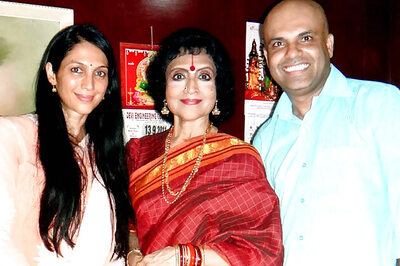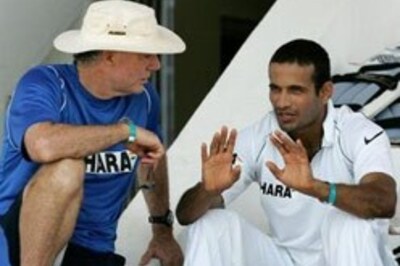
views
BANGALORE: Meditation, motor skills, ethics, social skills, self-esteem, self-reliance, stage exposure, live shows. Good habits, reasoning skills, general knowledge, reading, writing and counting.Not surprisingly, if you’re just wondering why these random words are popular in the commercial world. Well, each one has a value and is termed as ‘brain developers’ for the kids, only to be a part of the curriculum list in some of the pre-schools, kindergartens and Montessori schools.Devi Prasad, not even two-years-old, was put into pre-school, not because his parents wanted ‘brain development’ for their children, but because they hardly had time to take care of him in their busy structured life. His childhood is taken care of at a home turned school run by a couple, who handle little students without any pre-requisite to become a qualified pre-school teacher. Prasad, plays with other kids in the school, lifts a big balloon typed ball, which otherwise is termed physical development and is part of his gym activities at the school, handles electronic devices to play music, listen to rhymes and dance, only to become a gadget guru at a later stage.Well, some of the activities in the list might just be the day-to-day activity of the child in the normal course, but it gets structured, timed and instructional, to suit the needs of this unregulated industry of early childhood care.The crucial six yearsEarly childhood is the first six years of life, which is considered to be the most crucial period for inculcating learning and development. During this period, the kids absorb everything they are exposed to, using all their senses. Pre-schools essentially reach out to the child from the age of 10 months, keeping in mind, his earlier growth and also his developmental needs.According to 2011 census, India has 158.7 million children in the 0-6 year age group. Of the 158.7 million children in the below-six-years category, about 75.7 million children (48 per cent) are reported to be covered under the Integrated Child Development Services (ICDS) scheme. A significant number is also covered by the private sector, for which there is no data available.The pre-schools we saw a decade ago that targeted the upper middle class which tended to be academically focused, today are growing beyond the ‘class’ divide and cater to every section of the society, mostly in urban areas. Some of the chain-schools like Kidzee, admit kids as young as 9-10 months of age and some go with the westernised curriculum which may not necessarily suit the Indian segment. But, the ones catering to the rural kids and differently-abled kids are a cause for worry.Lack of standardsThe quality of these pre-schools or early childhood care that imparts education through multiple channels is that it is uneven, and varies from institute to institute.“Our curriculum was adopted based on western market and Montessori concept from Italy. We do not see any threat in adopting the western model as the world is shrinking and globalising education system has become important. We do cater to the rural segment and our teaching aids will not differ between rural and urban,” said Pritam Agarwal, Founder Director of Hello Kids, a pre-school chain which has over 160 centers across India. “Only organised school management can take on this voluminous task of maintaining a standard across the centers and ensure quality is delivered”, he added. However, education experts are calling for a strict legislation for the regulation of Early Childhood Care and Education (ECCE), which could monitor the curriculum, ensure quality, technological investment and licensing mechanism.Dr Usha Arbol, a child development consultant and former regional director National Institute of Public Cooperation and Child Development, said, “Today, anybody can start a pre-school without any permission or licensing. Early Childhood Care Education (ECCE) is estimated to be a ` 4,000 crore industry, which currently has no monitoring mechanism and is projected to grow at 35 per cent annually.” In counties like Canada and Australia, the ECCE sector is regulated by 17 regulatory bodies and the governments monitor the education standards and conduct regular inspection. And, importantly, the full-time staff undergoes, either a four year bachelors degree in early education or a two year early education diploma from community college through post-secondary education.Even in a country like Pakistan, NGOs like Plan International Pakistan, which work for promoting child rights are streamlining the syllabus and have piloted this in 101 of the total 390 government schools which were reconstructed in flood-hit areas of southern Punjab, by the Plan International Pakistan.Strict legislationBut in India, without any regulation, more and more pre-schools and kindergartens are mushrooming, while education experts call for a strict legislation for the regulation of Early Childhood Care and Education (ECCE), though there exists a draft policy on ECCE, which fails to address some of the prominent issues of profit making, rural-urban divide, technology investment and control mechanism. But, the draft policy aims at standardising the quality of ECCE available to children by laying down basic quality standards and specifications across public, private and voluntary sectors. Unlike the formal education sector, schools and universities, pre-schools are not bound by the Supreme Court’s ruling that bars profiteering in education and where directors of education can ask these schools to reduce the fees and other charges who are indulging only for profit motives.The ECCE will not fall under the purview of department of education but is part of the department of women and child. This ECCE policy will cover all early childhood care and education programmes and related services in public, private and voluntary sectors in all settings across regions. These services include anganwadis (AWC), creches, play schools, preschools, nursery schools, kindergartens, preparatory schools, balwadis, and home-based care.Chairman, Child Welfare Committee, Karnataka, Meena K Jain said that ECCE should fall under the Department of Education for better implementation and resource mobilisation.Rural-Urban divideYet another aspect is that, these schools are not entering the rural market to bring in equality in education. While rural kids would start to hold a slate at the age of 6, urban kids at these centers would be using mini-laptops and getting equipped to changing times, which could create a serious imbalance.“I wonder if the draft policy on ECCE will address this issue. Funding will be an important aspect and though ECCE received attention in the National Policy for Children (1974), consequent to which the ICDS was initiated, we still have a long way to go and tough challenges are ahead,” Jain added.But, the kids in anganwadis, managed under ICDS, were given importance on the nutritious benefit ignoring the early education training because of lack of trained staff and training equipment.




















Comments
0 comment